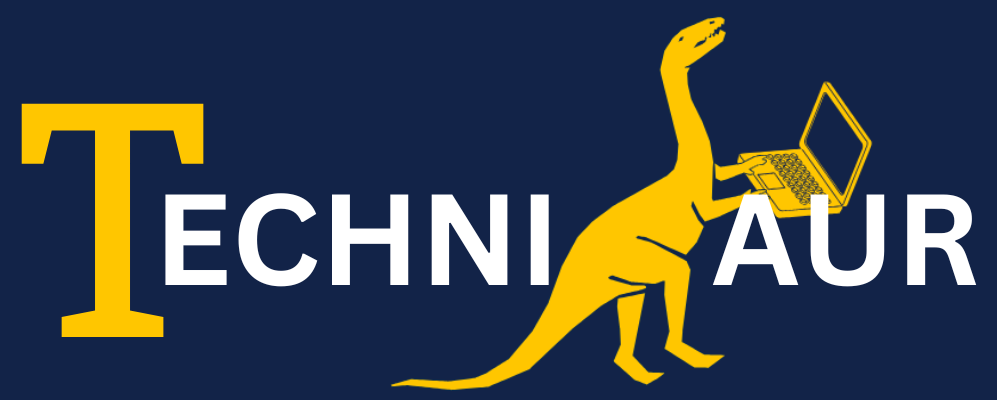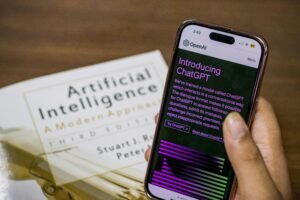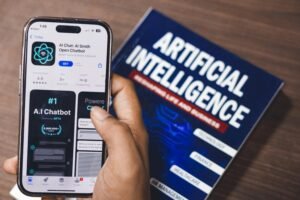
These days, one of the most important and quickly developing areas of technology is artificial intelligence (AI). Reading books on artificial intelligence authored by experts in the field is one of the finest ways to have a thorough understanding of artificial intelligence.
Through applications like deep learning, robotics, machine learning, and natural language processing, it is changing business operations, revolutionizing industries, and changing daily life.
Professionals, researchers, students, and enthusiasts alike must keep up with the latest advancements, difficulties, and opportunities in artificial intelligence. There are books that are suited to your needs, whether you are a professional wanting in-depth information, a beginner seeking an introduction to AI, or someone curious about the ethical and societal implications of AI.
Books on artificial intelligence for Beginners

The top books on artificial intelligence are looked at in this article, which is divided into sections based on interest and skill levels. These books offer an excellent introduction to the basics of artificial intelligence for those who are unfamiliar with it:
- Melanie Mitchell’s book “Artificial Intelligence: A Guide for Thinking Humans”
This book is perfect for people who have no previous understanding of AI because it is very approachable and provides straightforward, interesting explanations of the topics.
- Max Tegmark’s book “Life 3.0: Being Human in the Age of Artificial Intelligence.
This book looks at how AI is affecting society and how it could affect the future of humanity.
- Andriy Burkov’s “The Hundred-Page Machine Learning Book.”
A concise yet thorough manual on machine learning that simplifies difficult topics.
Books for Professionals and Technical Enthusiasts

These publications provide in-depth technical knowledge for people with a background in computer science, mathematics, or programming. They are crucial for developers, researchers, and students wishing to broaden their knowledge because they cover AI principles, machine learning strategies, and neural networks. Neural networks, sophisticated machine learning methods, and fundamental AI concepts are all covered.
- The book Artificial Intelligence: A Modern Approach” by Peter Norvig and Stuart Russell is a popular textbook on the principles, algorithms, and applications of artificial intelligence.
- Deep Learning” by Ian Goodfellow, Yoshua Bengio, and Aaron Courville.
A comprehensive overview of deep learning, neural networks, and modern AI techniques.
- Pattern Recognition and Machine Learning” by Christopher Bishop.
An intensely mathematical book about statistical pattern recognition and machine learning.
Books on AI Ethics and Society

Policy debates and ethical issues have become increasingly important as AI becomes more ingrained in society. These books on artificial intelligence explore AI’s societal, legal, and moral implications:
- Cathy O’Neil’s book “Weapons of Math Destruction”
Explores how big data and artificial intelligence might exacerbate prejudice and social injustice.
- Nick Bostrom’s book “Superintelligence: Paths, Dangers, Strategies”
Explores the possible dangers and repercussions of extremely sophisticated AI systems outperforming humans.
- Michael Kearns and Aaron Roth’s The Ethical Algorithm
Tackles the challenges of developing impartial and equitable AI systems.
Books on Artificial intelligence in Business and Industry

These books offer insights into the economic impact and real-world uses of artificial intelligence, which is transforming the commercial world:
The AI Advantage: How to Put the Artificial Intelligence Revolution to Work” by Thomas H. Davenport offers advice on how businesses could integrate AI into their everyday operations.
Ajay Agrawal, Joshua Gans, and Avi Goldfarb’s book “Prediction Machines:
The Simple Economics of Artificial Intelligence” explains how AI improves decision-making and affects market dynamics.
Adelyn Zhou, Marlene Jia, and Mariya Yao. “The Applied Artificial Intelligence:
A Handbook for Business Leaders” is a useful manual for company executives on how to apply AI-powered solutions
Keep up with resources.
Regardless of your role—developer, researcher, or student—these books offer crucial perspectives on AI techniques. They address a range of topics, from basic AI ideas to advanced artificial intelligence methods and neural networks. These books offer crucial insights whether you are a researcher exploring state-of-the-art techniques, a software developer hoping to apply AI in practical applications, or a student hoping to deepen your theoretical understanding. One of the finest ways to understand AI is its books on artificial intelligence, and apart from books, “TechniSaur” is a great resource for people who wish to keep up with the most recent developments, research, and trends in artificial intelligence.
TechniSaur is a preferred site for tech lovers, professionals, and enterprises because of its comprehensive material about artificial intelligence, technology, and upcoming trends. TechniSaur provides trustworthy and interesting information to keep you ahead of the AI revolution, whether you’re looking for book suggestions, industry updates, or in-depth analyses of AI developments.
Conclusion
A dynamic and quickly developing science, artificial intelligence affects many facets of our lives. There is a book on artificial intelligence for everyone, regardless of whether you are new to AI, looking for technical know-how, or investigating its ethical and commercial ramifications. You may learn more about AI and keep up with its latest advancements by reading these thought-provoking books. Continue to learn, maintain your curiosity, and accept the AI-driven future with awareness and wisdom.
Frequently Asked Questions (FAQ)
Which books are the best for those who are new to artificial intelligence?
The Hundred-Page Machine Learning Book by Andriy Burkov, Life 3.0 by Max Tegmark, and Artificial Intelligence: A Guide for Thinking Humans by Melanie Mitchell are all excellent works for novices. Without having a technical background, these books offer concise and interesting explanations of AI ideas.
Which books are the best for those who are new to artificial intelligence?
The Hundred-Page Machine Learning Book by Andriy Burkov, Life 3.0 by Max Tegmark, and Artificial Intelligence: A Guide for Thinking Humans by Melanie Mitchell are all excellent works for novices. Without having a technical background, these books offer concise and interesting explanations of AI ideas.
Which books are the best for scholars and professionals working in AI?
Professionals and researchers can benefit from reading books like Stuart Russell and Peter Norvig’s Artificial Intelligence: A Modern Approach, Christopher Bishop’s Pattern Recognition and Machine Learning, and Ian Goodfellow’s Deep Learning. Advanced AI principles, algorithms, and applications are covered in these works.
Which books discuss the ethical and societal implications of artificial intelligence?
Indeed, the ethical issues, dangers, and societal ramifications of artificial intelligence are examined in publications like Michael Kearns and Aaron Roth’s The Ethical Algorithm, Nick Bostrom’s Superintelligence, and Cathy O’Neil’s Weapons of Math Destruction.
How can entrepreneurs and company executives benefit from AI books?
AI books that offer insights on using AI for corporate growth, decision-making, and competitive advantage include Applied Artificial Intelligence by Mariya Yao, Prediction Machines by Ajay Agrawal, and The AI Advantage by Thomas H. Davenport.
Where can I find book recommendations and the most recent AI trends?
Organizations such as TechniSaur provide insightful information about technology, AI, and market trends. It’s a great way to keep up with new books about artificial intelligence.




